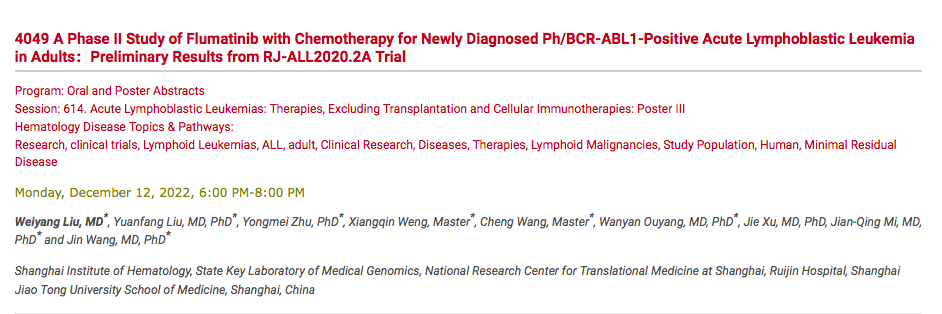The 64th ASH (American Society of Hematology) Annual Meeting and Exposition is scheduled to take place in New Orleans, USA from December 10 to 13, 2022. The latest clinical trial results of Hansoh Xinfu (Flumatinib Mesylate Tablets), an innovative drug of Hansoh Pharma, will be presented in a Poster, oral form, representing a high degree of recognition by international authoritative experts of the efficacy and safety of flumatinib, a second-generation TKI developed independently in China, in primary ph+ALL.
As China's first original and novel second-generation tyrosine kinase inhibitor (TKI), Hansoh Xinfu achieves "two-way optimization" in terms of efficacy and safety for the treatment of chronic myeloid leukemia in chronic phase, with higher response rate, faster and deeper response, and better tolerance, becoming a clinically preferred "second-generation+ TKI". Since its launch in 2019, patients have benefited significantly, and the number of long-term users has kept going up.

POSTER 4049
A Phase II Study of Flumatinib with Chemotherapy for Newly Diagnosed Ph/BCR-ABL1-Positive Acute Lymphoblastic Leukemia in Adults: Preliminary Results from RJ-ALL2020.2A Trial
Leading PIs: Mi Jianqing and Wang Jin, Ruijin Hospital Affiliated to Shanghai Jiao Tong University School of Medicine
Background
Tyrosine kinase inhibitors (TKIs) have significantly improved clinical outcomes of patients (pts) with Ph/BCR-ABL1-positive (Ph/BCR-ABL1+) acute lymphoblastic
leukemia (ALL).The second-generation TKIs result in a better response rate and survival, compared to the first-generation. Flumatinib is a novel second-generation TKI and has been approved in 2019 in China. It has been demonstrated better efficacy compared to imatinib in clinical trials of CML, but few reports are available in ALL Herein, RJ-ALL2020.2A trial is the first registered clinical trial of flumatinib inPh/BCR-ABL1+ ALL to evaluate its efficacy and safety in adult pts.
Results
From August 2020 to June 2022, 44 adult pts with de novo Ph/BCR-ABL1+ ALL were enrolled. Median age was 44 years (range, 19-63). Median WBC count was 39.9×109/L (0.6-675.3), and 4 pts had primary CNS leukemia (Table 1).
There was no early death during the induction course. 41/44 (93.2%) pts achieved CR at the end of induction. MRDneg (<0.01%) rates by MFC were 65.9% (27/41) and 76.9% (30/39), while the CMR rates were 35% (14/40) and 50% (19/38) at the end of induction and 3 months, respectively. With a median follow-up of 10 months (range,1-16), the estimated 1-year PFS and OS rates were 79.9% and 90.3%, respectively (Figure 1A, B). Among the 41 survived pts, 34 pts were in continuous remission, 2 were refractory and 5 were relapsed. Among 3 deaths, 2 died of disease progression, and 1 of pulmonary infection post-HSCT. 24 pts received allo-HSCT with a median time of 6 months (range, 3-10) from diagnosis (12 with haploidentical donors and 12 matched donors), the median age was 38 years (range, 20-60). Before HSCT, MRDneg rate was 75% (18/24), and CMR rate was 66.7% (16/24). Pts who underwent HSCT had a relatively better outcome, with 1-year PFS rate signi.2%, p=0.006) (Figure 1C), and 1-year OS rate tending to be higher (100% vs. 74.1%, p=0.145). Among 40 pts evaluable for ABL1 mutations, 14 pts were mutated. T315I was most frequently identified, accounting for 71%, followed by Y253H(29%), E255K(7%)。Pts with T315I mutation showed a poorer outcome than non-T315I mutation( no mutation or other mutations), with 1-year PFS rates 0% vs. 100%(p<0.001)(Fiture 1D), 1-year OS rates 55.6% vs. 100%(P=0.06), respectively.
Meanwhile, the combination of flumatinib and chemotherapy was well-tolerated. The adverse events of grade 3-4 were mostly hematologic, which may be related to induction chemotherapy. Other side effects such as gastrointestinal symptoms and hepatic toxicity were grade 1-2,which could be recovered soon after symptomatic management. No pt discontinued flumatinib due to toxicity.
Conclusion
The combination of the second-generation TKI flumatinib and chemotherapy is quite effective and safe in Chinese adult pts with newly diagnosed Ph/BCR-ABL1+ ALL This clinical trial is still ongoing and the long term follow-up data will be further investigated
